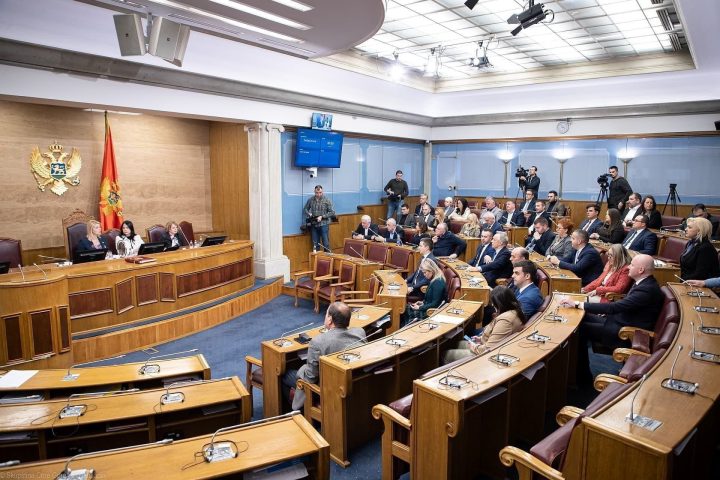- HRA kontakt
- Tel: +382 20 232 348
- hra@t-com.me
A DISSOLVED ASSEMBLY CAN PERFORM ONLY CURRENT AND URGENT TASKS

OMBUDSMAN TO REACT: MINISTER VIOLATES THE LAW AND INTERNATIONAL HUMAN RIGHTS STANDARD BY REFUSING TO SUSPEND POLICE INSPECTORS ACCUSED OF TORTURE
30/03/2023
ECtHR REJECTS THE APPLICATION OF DEPORTATION VICTIMS: THEY LACK VICTIM STATUS, THE STATE SUFFICIENTLY RECOGNISED VIOLATION OF THEIR RIGHTS EVEN WITHOUT PUNISHING THOSE RESPONSIBLE
07/04/2023A DISSOLVED ASSEMBLY CAN PERFORM ONLY CURRENT AND URGENT TASKS

Photo: website of the Parliament of the Montenegro
As the President of the State has issued the decree on its dissolution, the Parliament of Montenegro no longer has full jurisdiction and can only perform current and urgent tasks until the election of a new convocation.
Dr. Violeta Beširević, Dean and full Professor at the Faculty of Law of the Union University in Belgrade and Associate Researcher of the Central European University in Budapest/Vienna and the Centre for Law and Pluralism of the University of Milano-Bicocca, concluded and further explained this to the HRA.
The above means that, under the current circumstances, the dissolved Assembly could: conduct a second round of voting on the candidate for the judge of the Constitutional Court (if there are conditions for him/her to be elected) in order to prevent said Court’s potential blockade caused by the fact that it cannot take decisions with an even number of judges; consider a proposal to abolish the immunity of deputies for the purpose of conducting criminal proceedings; and vote on amendments to the Law on Temporary Child Support to enable the continuation of payments from the Alimony Fund so as not to jeopardise the existence of numerous families. What certainly cannot be considered a priority are amendments to the Law on Civil Procedure related to lawsuits involving permanent confiscation of property benefits gained through criminal activity, which were adopted at yesterday’s telephone-session of the Government, or amendments to the Law on Confiscation of Property Benefits, made once again without adequate public discussion despite criticism from the European Commission.
We remind that members of the Parliament of Montenegro have adopted four laws since the decree on dissolution was issued, that is, since March 16. Among them were the amendments to the Law on Local Self-Government, which could not be considered “current and urgent tasks” because they referred to the announcement of the results of local elections which was made possible by the unblocking of the Constitutional Court.
Eight laws, a proposal to revoke the immunity of five deputies, and the second round of voting on the fourth candidate for judge of the Constitutional Court are on the agenda of the Assembly session scheduled for today, April 4 at 11:00 am. The MPs even asked to amend the agenda to allow 12 more laws to be considered. Among them are the amendments to the Law on Temporary Child Support, initiated after the suspension of payments from the Alimony Fund, and amendments to the Law on Civil Procedure and the Law on Confiscation of Property Benefits Gained through Criminal Activity.
The Constitution of Montenegro does not prescribe the continuation of the Assembly’s work once it is dissolved, unlike the Government which – when its mandate ends – continues to work until a new Government is elected. On the other hand, Article 14, paragraph 3 of the Law on the Election of Councillors and Members of Parliament stipulates that the mandate of the deputies ends on the day of confirmation of the mandate of the deputies of the new convocation.
Professor Beširević explained that it is common to link the termination of the mandate of deputies to the verification of the mandate of new deputies, in order to avoid the Assembly being an illegitimate body, which would lead to the absence of governance. This does not mean, however, that the above provides grounds for the regular continuation of the work of the Assembly, which is why it is usually prescribed that a dissolved Assembly should deal only with current and urgent affairs, and that its full jurisdiction can be be established only in cases of war or state of emergency. Such a solution exists, for example, in the Constitution of the Republic of Serbia, where Article 109, paragraph 1 stipulates that the National Assembly that has been dissolved performs only current or urgent tasks determined by law, while its full jurisdiction can be re-established in the case of war or declaration of a state of emergency, lasting until the end of such state. Although the Constitution of the Republic of Croatia (like ours) does not explicitly prescribe what happens with the dissolved parliament, after their own dissolution of the National Assembly, which took place on 18 May 2020, the MPs, i.e. deputies suspended their work. The dissolution also caused protests from citizens because it occurred before certain important laws, such as the Law on the Reconstruction of Zagreb after the Earthquake, could be adopted.
We remind that President Milo Djukanović issued a decree on the dissolution of the Assembly on 16 March, and that it entered into force on the day of adoption. Nine days later it was published in the Official Gazette, and its constitutionality was contested by 41 deputies who submitted a proposal for constitutional review to the Constitutional Court, which decided to give the case a priority and consider it along with examining the constitutionality of the amendments to the Law on the President. Until that happens, it would not be not appropriate to ignore the fact that the Assembly is dissolved.







 English
English